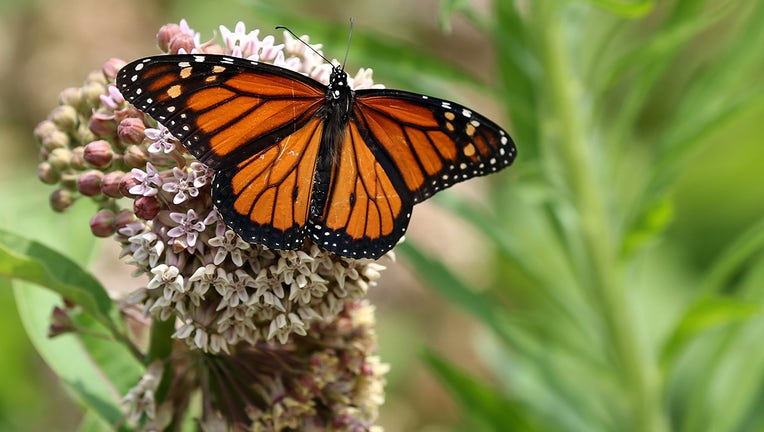National Flower Day: Plant this "weed" to help the monarch butterfly population

File: Monarch butterfly (Danaus plexippus) on a milkweed plant flower in Toronto, Ontario, Canada, on July 08, 2022. (Photo by Creative Touch Imaging Ltd./NurPhoto via Getty Images)
LOS ANGELES - March 21 is National Flower Day, and to celebrate, folks can plant some milkweed and start a pollinator garden to help the dwindling numbers of monarch butterflies.
According to an annual report from the World Wildlife Fund, the insects’ population decreased to its second-lowest number on record.
The new data detailing the abundance of the eastern monarch butterfly colonies wintering in central Mexico’s forests estimated that the species occupied only 2.2 acres during the 2023-2024 winter season – 59% less than the previous year when scientists observed 5.5 acres.
The organization said the threats to the butterfly population include a decline of milkweed due to the use of herbicides, climate change, land use change in North America and forest degradation in Mexico.
How to help the monarch butterfly population
As spring arrives, monarch butterflies start their migration back north to Canada and the U.S., seeking out milkweed to lay their eggs and nectar plants to eat.
According to WWF, milkweed is essential to the monarch: It is the only plant on which they lay their eggs and the only source of food for baby monarch caterpillars.
But the increased use of herbicides in agricultural expansion and the paving over of land for urban growth have destroyed millions of acres of milkweed – so much so that the migratory monarchs are now classified as endangered.
RELATED: Western monarch butterfly population suffers due to atmospheric river storms
WWF said you can help these insects and other pollinators – by planting nectar plants and the right species of milkweed in your own backyard.
You can use the organization’s "milkweed finder" to find the right type of milkweed to plant where you live.
"This small action can make a big difference in the survival of these beloved butterflies," WWF wrote.
They said a local nursery or flower retailer should have the right type of milkweed to plant. You can also buy milkweed directly from Monarch Watch.
Things to know about milkweed
Milkweed is beneficial to butterflies but it can be bad for livestock – especially horses. The plant's sap contains compounds called cardenolides that can affect a variety of animals, including cats and dogs, and be poisonous if consumed in large quantities.
Common milkweed can also be an aggressive plant and requires maintenance in some landscaping situations.
This story was reported from Los Angeles.

